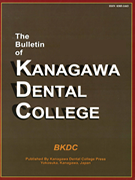- HOME
- > 一般の方
- > バックナンバー:The Bulletin of Kanagawa Dental College
- > 25巻2号
- > アブストラクト
アブストラクト(25巻2号:The Bulletin of Kanagawa Dental College)

English
| Title : | Influence of Adhesion Molecules on Periodontal Disease |
|---|---|
| Subtitle : | BKDC CLINICAL AND RESEARCH TOPICS : Adhesion Molecule |
| Authors : | Shinji Deguchi1, Mitsuo Fukuno1, Satoru Sato1, Masamichi Hirabayashi2, Toshio Hori1 |
| Authors(kana) : | |
| Organization : | 1Department of Periodontology, Kanagawa Dental College, 2Department of Endodontology, Kanagawa Dental College |
| Journal : | The Bulletin of Kanagawa Dental College |
| Volume : | 25 |
| Number : | 2 |
| Page : | 109-114 |
| Year/Month : | 1997 / 9 |
| Article : | Report |
| Publisher : | Kanagawa Odontological Society |
| Abstract : | [Abstract] Gingival inflammation is characterized by the infiltration of blood mononuclear cells, especially B lymphocytes and T lymphocytes, into sites of bacterial injury. A differential expression of adhesion molecules may play a role in lymphocytes trafficking in these tissues. Periodontal diseases are mediated by complex host and parasite interaction, that leads to the loss of connective tissues attachment to root surface cementum and adjacent alveolar bone. Diseases known to be associated with periodontitis before puberty include Papillon-Lefevre syndrome, hypophosphatasia, neutropenias, leukocyte adhesion deficiency (LAD), Chediak-Higashi syndrome, Down's syndrome, leukemia, histiocytosis X, early onset Type I diabetes, and acrodynia. LAD constitutes a combination of cell surface receptor defects on polymorphonuclear leukocytes (PMNLs), monocytes, lymphocytes, and macrophages. This short review focuses on severe periodontal disease associated with LAD. |
| Practice : | Dentistry |
| Keywords : | Periodontitis, Adhesion molecules, Leukocyte adhesion deficiency, β2 integrin, Selectin |
